Holmes Institute Business and Corporate Law Assignment Report
VerifiedAdded on 2022/11/26
|11
|2527
|238
Report
AI Summary
This assignment report analyzes two case studies related to Australian Business and Corporate Law. Part 1 examines a negligence claim against a bus company, focusing on the application of exclusion clauses and the recoverability of damages for injury and loss of enjoyment, referencing relevant case law such as Donoghue v Stevenson and Lamb v. London Borough of Camden. Part 2 delves into the statutory and common law duties of company directors under the Corporations Act 2001 (Cth), specifically addressing fiduciary duties, the business judgment rule, and potential breaches of duty by directors, including issues of insider information and conflicts of interest. The report applies these legal principles to the facts of the case, assessing the liabilities of various parties involved. The assignment also includes a summary of the answers for both parts and a PowerPoint presentation for a group presentation.
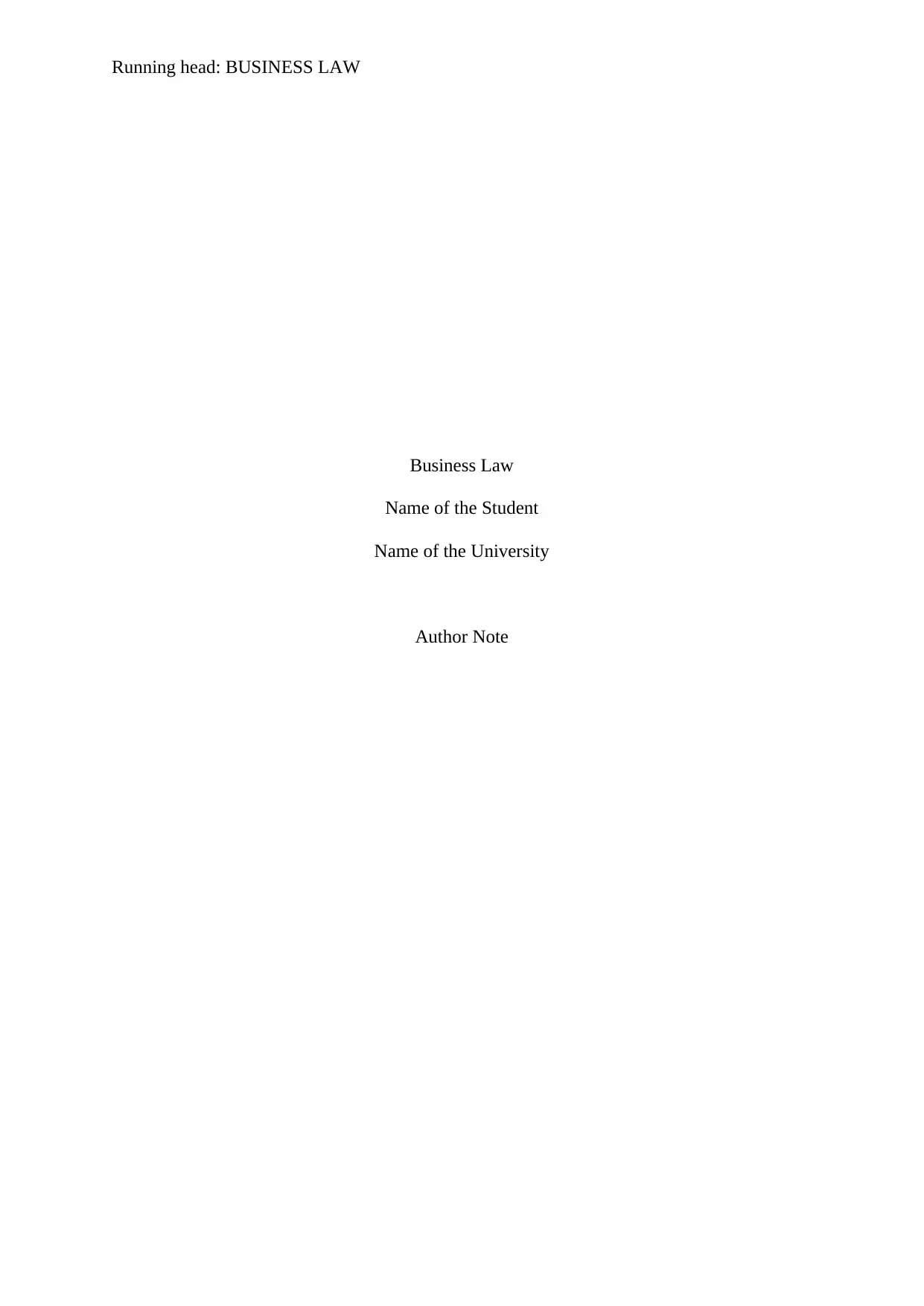
Running head: BUSINESS LAW
Business Law
Name of the Student
Name of the University
Author Note
Business Law
Name of the Student
Name of the University
Author Note
Paraphrase This Document
Need a fresh take? Get an instant paraphrase of this document with our AI Paraphraser
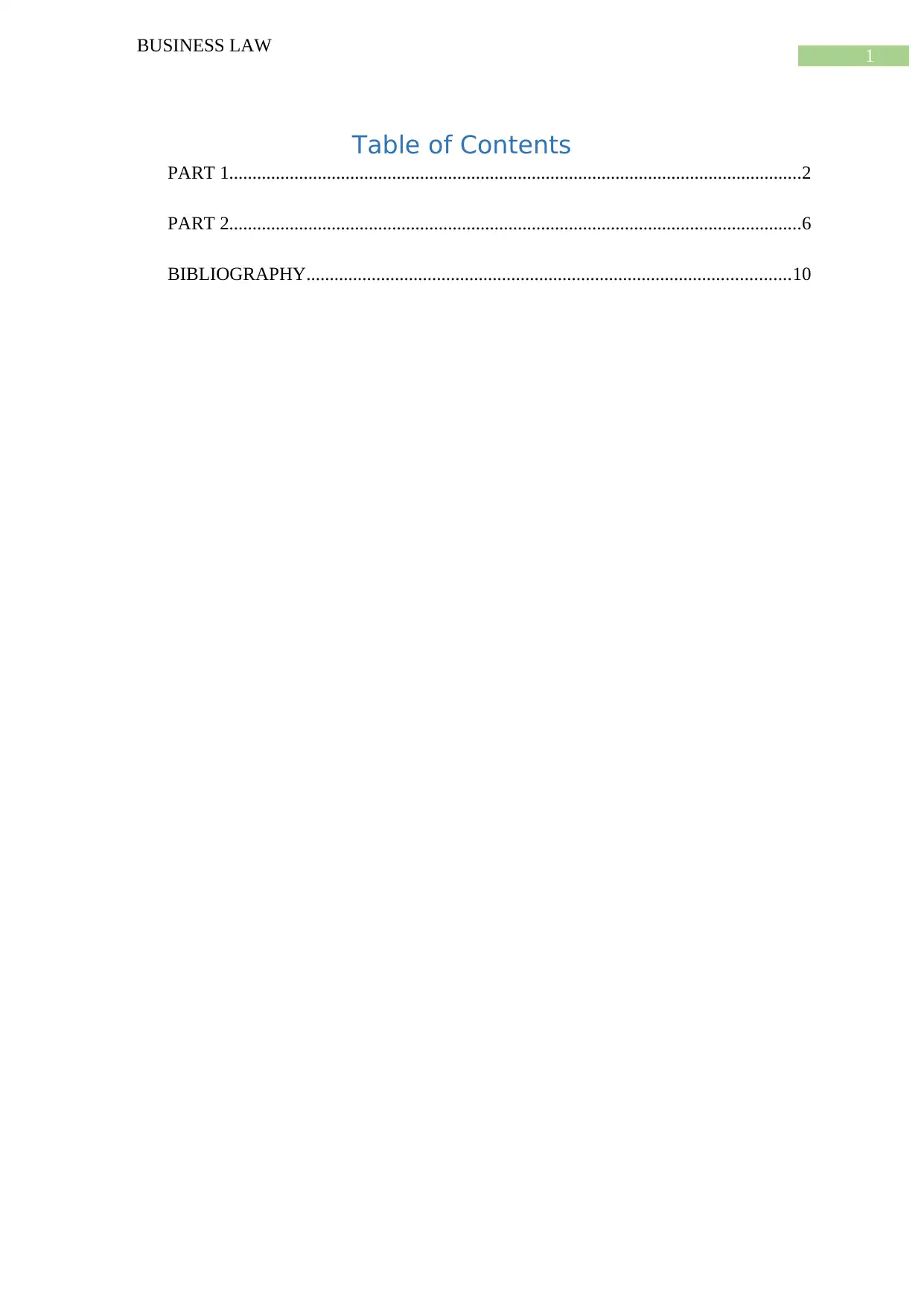
1
BUSINESS LAW
Table of Contents
PART 1...........................................................................................................................2
PART 2...........................................................................................................................6
BIBLIOGRAPHY........................................................................................................10
BUSINESS LAW
Table of Contents
PART 1...........................................................................................................................2
PART 2...........................................................................................................................6
BIBLIOGRAPHY........................................................................................................10
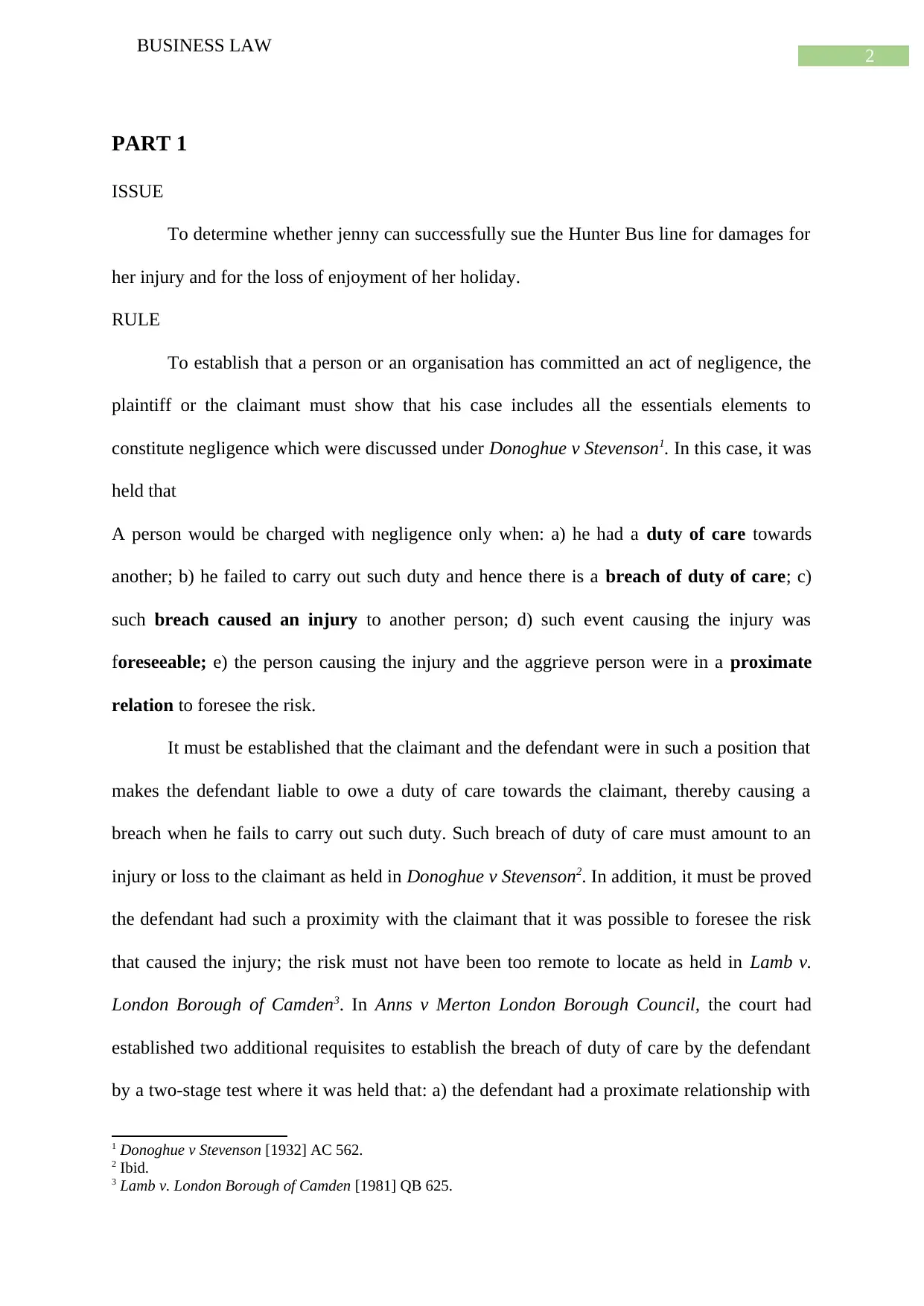
2
BUSINESS LAW
PART 1
ISSUE
To determine whether jenny can successfully sue the Hunter Bus line for damages for
her injury and for the loss of enjoyment of her holiday.
RULE
To establish that a person or an organisation has committed an act of negligence, the
plaintiff or the claimant must show that his case includes all the essentials elements to
constitute negligence which were discussed under Donoghue v Stevenson1. In this case, it was
held that
A person would be charged with negligence only when: a) he had a duty of care towards
another; b) he failed to carry out such duty and hence there is a breach of duty of care; c)
such breach caused an injury to another person; d) such event causing the injury was
foreseeable; e) the person causing the injury and the aggrieve person were in a proximate
relation to foresee the risk.
It must be established that the claimant and the defendant were in such a position that
makes the defendant liable to owe a duty of care towards the claimant, thereby causing a
breach when he fails to carry out such duty. Such breach of duty of care must amount to an
injury or loss to the claimant as held in Donoghue v Stevenson2. In addition, it must be proved
the defendant had such a proximity with the claimant that it was possible to foresee the risk
that caused the injury; the risk must not have been too remote to locate as held in Lamb v.
London Borough of Camden3. In Anns v Merton London Borough Council, the court had
established two additional requisites to establish the breach of duty of care by the defendant
by a two-stage test where it was held that: a) the defendant had a proximate relationship with
1 Donoghue v Stevenson [1932] AC 562.
2 Ibid.
3 Lamb v. London Borough of Camden [1981] QB 625.
BUSINESS LAW
PART 1
ISSUE
To determine whether jenny can successfully sue the Hunter Bus line for damages for
her injury and for the loss of enjoyment of her holiday.
RULE
To establish that a person or an organisation has committed an act of negligence, the
plaintiff or the claimant must show that his case includes all the essentials elements to
constitute negligence which were discussed under Donoghue v Stevenson1. In this case, it was
held that
A person would be charged with negligence only when: a) he had a duty of care towards
another; b) he failed to carry out such duty and hence there is a breach of duty of care; c)
such breach caused an injury to another person; d) such event causing the injury was
foreseeable; e) the person causing the injury and the aggrieve person were in a proximate
relation to foresee the risk.
It must be established that the claimant and the defendant were in such a position that
makes the defendant liable to owe a duty of care towards the claimant, thereby causing a
breach when he fails to carry out such duty. Such breach of duty of care must amount to an
injury or loss to the claimant as held in Donoghue v Stevenson2. In addition, it must be proved
the defendant had such a proximity with the claimant that it was possible to foresee the risk
that caused the injury; the risk must not have been too remote to locate as held in Lamb v.
London Borough of Camden3. In Anns v Merton London Borough Council, the court had
established two additional requisites to establish the breach of duty of care by the defendant
by a two-stage test where it was held that: a) the defendant had a proximate relationship with
1 Donoghue v Stevenson [1932] AC 562.
2 Ibid.
3 Lamb v. London Borough of Camden [1981] QB 625.
⊘ This is a preview!⊘
Do you want full access?
Subscribe today to unlock all pages.

Trusted by 1+ million students worldwide
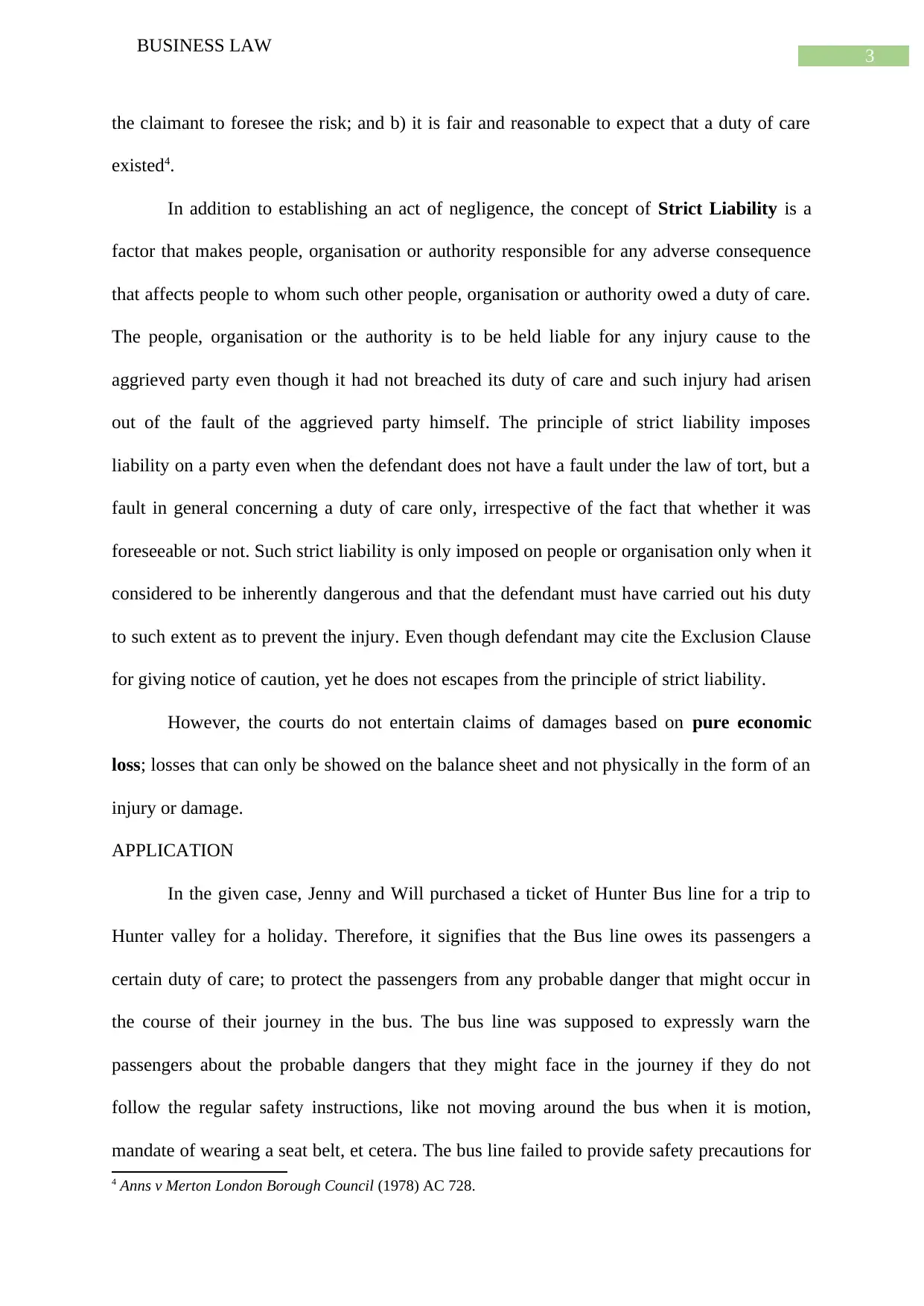
3
BUSINESS LAW
the claimant to foresee the risk; and b) it is fair and reasonable to expect that a duty of care
existed4.
In addition to establishing an act of negligence, the concept of Strict Liability is a
factor that makes people, organisation or authority responsible for any adverse consequence
that affects people to whom such other people, organisation or authority owed a duty of care.
The people, organisation or the authority is to be held liable for any injury cause to the
aggrieved party even though it had not breached its duty of care and such injury had arisen
out of the fault of the aggrieved party himself. The principle of strict liability imposes
liability on a party even when the defendant does not have a fault under the law of tort, but a
fault in general concerning a duty of care only, irrespective of the fact that whether it was
foreseeable or not. Such strict liability is only imposed on people or organisation only when it
considered to be inherently dangerous and that the defendant must have carried out his duty
to such extent as to prevent the injury. Even though defendant may cite the Exclusion Clause
for giving notice of caution, yet he does not escapes from the principle of strict liability.
However, the courts do not entertain claims of damages based on pure economic
loss; losses that can only be showed on the balance sheet and not physically in the form of an
injury or damage.
APPLICATION
In the given case, Jenny and Will purchased a ticket of Hunter Bus line for a trip to
Hunter valley for a holiday. Therefore, it signifies that the Bus line owes its passengers a
certain duty of care; to protect the passengers from any probable danger that might occur in
the course of their journey in the bus. The bus line was supposed to expressly warn the
passengers about the probable dangers that they might face in the journey if they do not
follow the regular safety instructions, like not moving around the bus when it is motion,
mandate of wearing a seat belt, et cetera. The bus line failed to provide safety precautions for
4 Anns v Merton London Borough Council (1978) AC 728.
BUSINESS LAW
the claimant to foresee the risk; and b) it is fair and reasonable to expect that a duty of care
existed4.
In addition to establishing an act of negligence, the concept of Strict Liability is a
factor that makes people, organisation or authority responsible for any adverse consequence
that affects people to whom such other people, organisation or authority owed a duty of care.
The people, organisation or the authority is to be held liable for any injury cause to the
aggrieved party even though it had not breached its duty of care and such injury had arisen
out of the fault of the aggrieved party himself. The principle of strict liability imposes
liability on a party even when the defendant does not have a fault under the law of tort, but a
fault in general concerning a duty of care only, irrespective of the fact that whether it was
foreseeable or not. Such strict liability is only imposed on people or organisation only when it
considered to be inherently dangerous and that the defendant must have carried out his duty
to such extent as to prevent the injury. Even though defendant may cite the Exclusion Clause
for giving notice of caution, yet he does not escapes from the principle of strict liability.
However, the courts do not entertain claims of damages based on pure economic
loss; losses that can only be showed on the balance sheet and not physically in the form of an
injury or damage.
APPLICATION
In the given case, Jenny and Will purchased a ticket of Hunter Bus line for a trip to
Hunter valley for a holiday. Therefore, it signifies that the Bus line owes its passengers a
certain duty of care; to protect the passengers from any probable danger that might occur in
the course of their journey in the bus. The bus line was supposed to expressly warn the
passengers about the probable dangers that they might face in the journey if they do not
follow the regular safety instructions, like not moving around the bus when it is motion,
mandate of wearing a seat belt, et cetera. The bus line failed to provide safety precautions for
4 Anns v Merton London Borough Council (1978) AC 728.
Paraphrase This Document
Need a fresh take? Get an instant paraphrase of this document with our AI Paraphraser
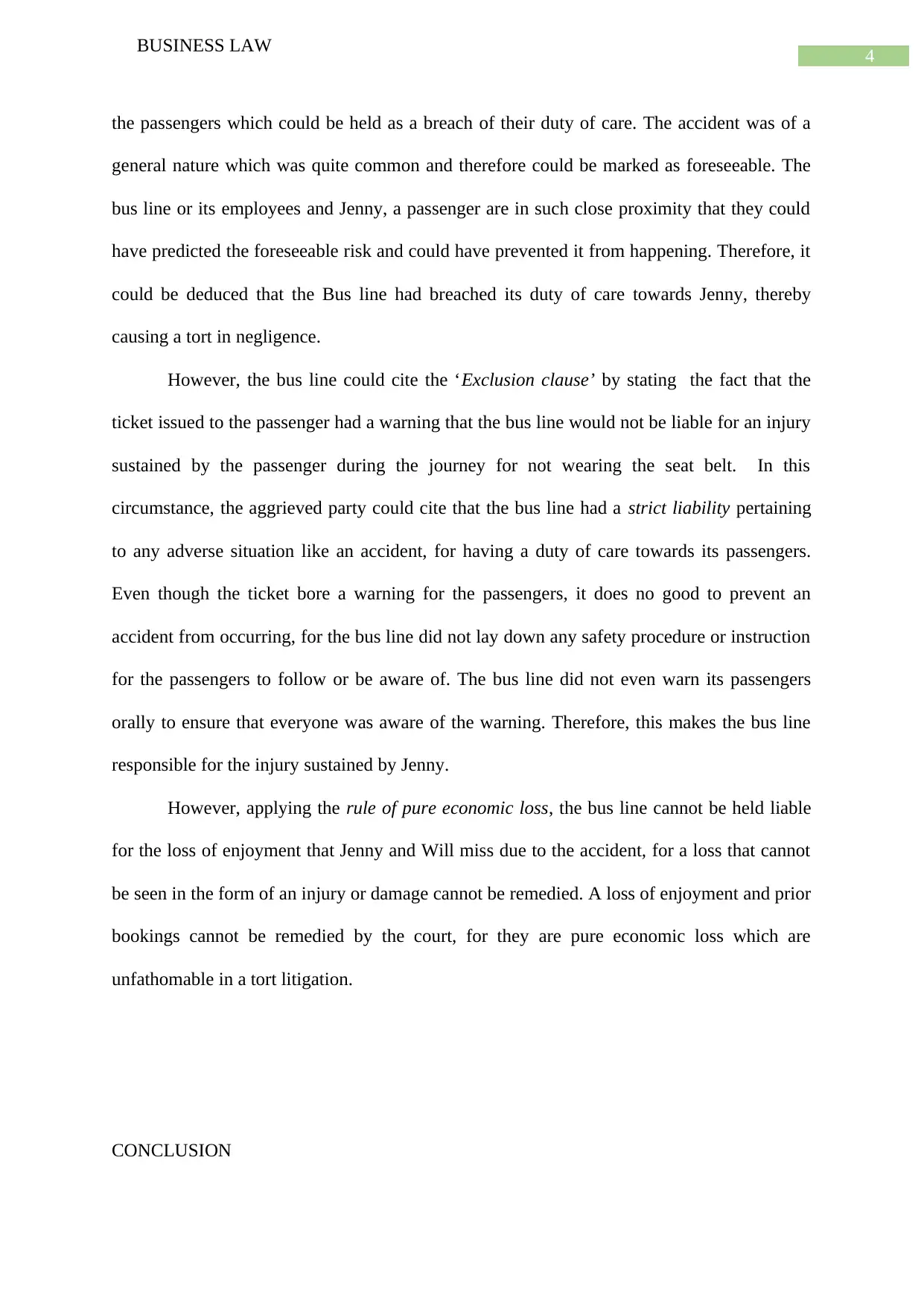
4
BUSINESS LAW
the passengers which could be held as a breach of their duty of care. The accident was of a
general nature which was quite common and therefore could be marked as foreseeable. The
bus line or its employees and Jenny, a passenger are in such close proximity that they could
have predicted the foreseeable risk and could have prevented it from happening. Therefore, it
could be deduced that the Bus line had breached its duty of care towards Jenny, thereby
causing a tort in negligence.
However, the bus line could cite the ‘Exclusion clause’ by stating the fact that the
ticket issued to the passenger had a warning that the bus line would not be liable for an injury
sustained by the passenger during the journey for not wearing the seat belt. In this
circumstance, the aggrieved party could cite that the bus line had a strict liability pertaining
to any adverse situation like an accident, for having a duty of care towards its passengers.
Even though the ticket bore a warning for the passengers, it does no good to prevent an
accident from occurring, for the bus line did not lay down any safety procedure or instruction
for the passengers to follow or be aware of. The bus line did not even warn its passengers
orally to ensure that everyone was aware of the warning. Therefore, this makes the bus line
responsible for the injury sustained by Jenny.
However, applying the rule of pure economic loss, the bus line cannot be held liable
for the loss of enjoyment that Jenny and Will miss due to the accident, for a loss that cannot
be seen in the form of an injury or damage cannot be remedied. A loss of enjoyment and prior
bookings cannot be remedied by the court, for they are pure economic loss which are
unfathomable in a tort litigation.
CONCLUSION
BUSINESS LAW
the passengers which could be held as a breach of their duty of care. The accident was of a
general nature which was quite common and therefore could be marked as foreseeable. The
bus line or its employees and Jenny, a passenger are in such close proximity that they could
have predicted the foreseeable risk and could have prevented it from happening. Therefore, it
could be deduced that the Bus line had breached its duty of care towards Jenny, thereby
causing a tort in negligence.
However, the bus line could cite the ‘Exclusion clause’ by stating the fact that the
ticket issued to the passenger had a warning that the bus line would not be liable for an injury
sustained by the passenger during the journey for not wearing the seat belt. In this
circumstance, the aggrieved party could cite that the bus line had a strict liability pertaining
to any adverse situation like an accident, for having a duty of care towards its passengers.
Even though the ticket bore a warning for the passengers, it does no good to prevent an
accident from occurring, for the bus line did not lay down any safety procedure or instruction
for the passengers to follow or be aware of. The bus line did not even warn its passengers
orally to ensure that everyone was aware of the warning. Therefore, this makes the bus line
responsible for the injury sustained by Jenny.
However, applying the rule of pure economic loss, the bus line cannot be held liable
for the loss of enjoyment that Jenny and Will miss due to the accident, for a loss that cannot
be seen in the form of an injury or damage cannot be remedied. A loss of enjoyment and prior
bookings cannot be remedied by the court, for they are pure economic loss which are
unfathomable in a tort litigation.
CONCLUSION
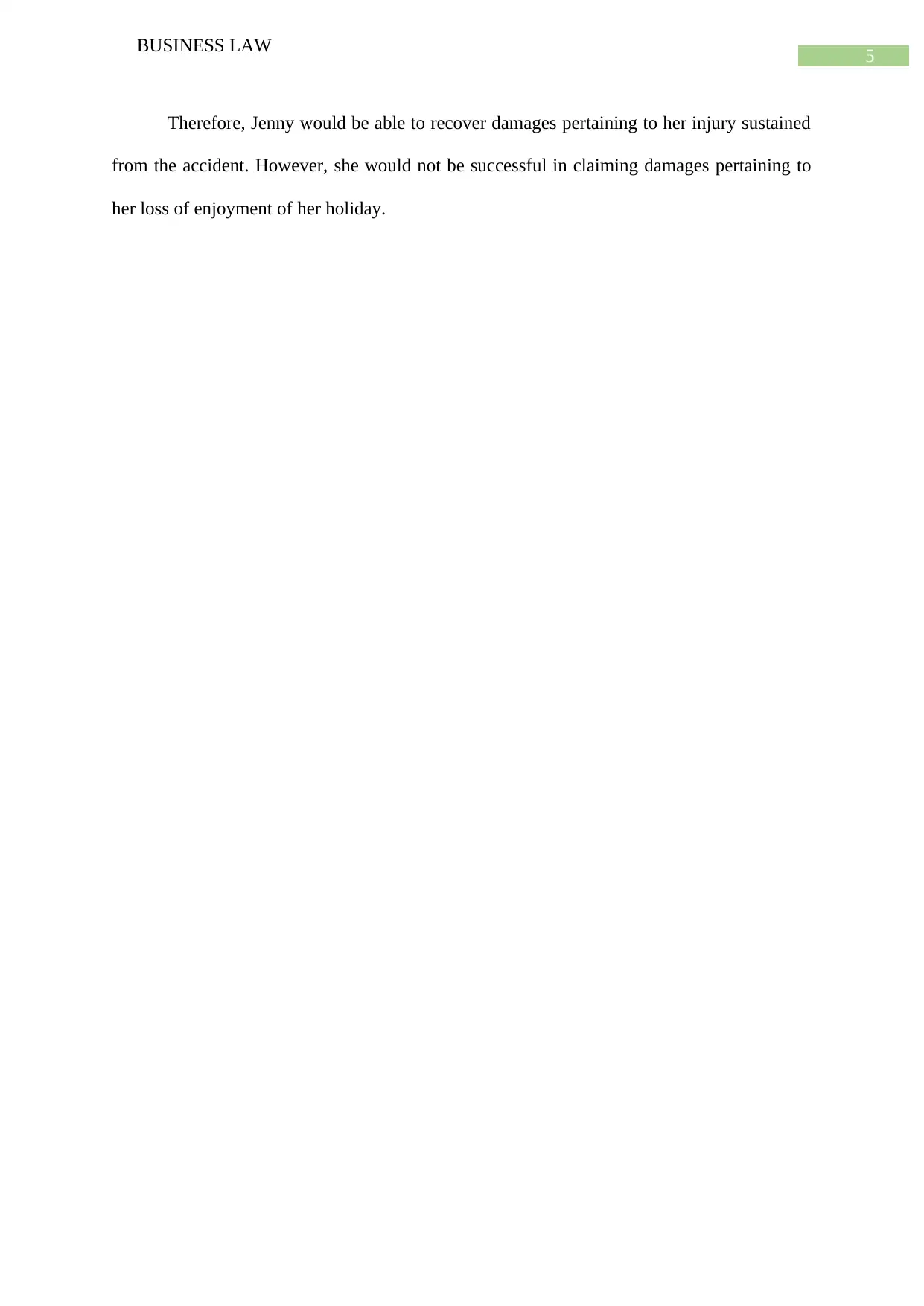
5
BUSINESS LAW
Therefore, Jenny would be able to recover damages pertaining to her injury sustained
from the accident. However, she would not be successful in claiming damages pertaining to
her loss of enjoyment of her holiday.
BUSINESS LAW
Therefore, Jenny would be able to recover damages pertaining to her injury sustained
from the accident. However, she would not be successful in claiming damages pertaining to
her loss of enjoyment of her holiday.
⊘ This is a preview!⊘
Do you want full access?
Subscribe today to unlock all pages.

Trusted by 1+ million students worldwide
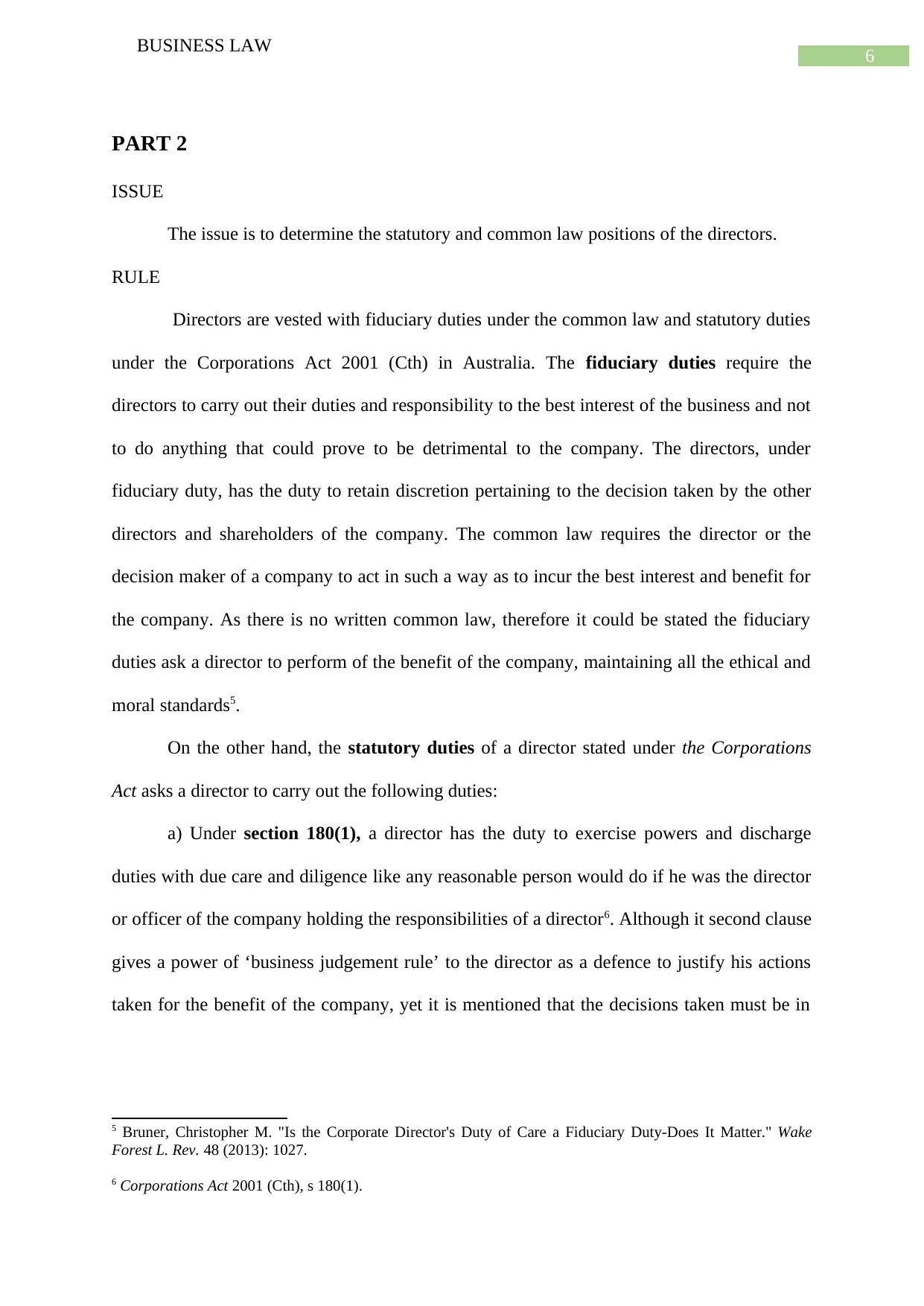
6
BUSINESS LAW
PART 2
ISSUE
The issue is to determine the statutory and common law positions of the directors.
RULE
Directors are vested with fiduciary duties under the common law and statutory duties
under the Corporations Act 2001 (Cth) in Australia. The fiduciary duties require the
directors to carry out their duties and responsibility to the best interest of the business and not
to do anything that could prove to be detrimental to the company. The directors, under
fiduciary duty, has the duty to retain discretion pertaining to the decision taken by the other
directors and shareholders of the company. The common law requires the director or the
decision maker of a company to act in such a way as to incur the best interest and benefit for
the company. As there is no written common law, therefore it could be stated the fiduciary
duties ask a director to perform of the benefit of the company, maintaining all the ethical and
moral standards5.
On the other hand, the statutory duties of a director stated under the Corporations
Act asks a director to carry out the following duties:
a) Under section 180(1), a director has the duty to exercise powers and discharge
duties with due care and diligence like any reasonable person would do if he was the director
or officer of the company holding the responsibilities of a director6. Although it second clause
gives a power of ‘business judgement rule’ to the director as a defence to justify his actions
taken for the benefit of the company, yet it is mentioned that the decisions taken must be in
5 Bruner, Christopher M. "Is the Corporate Director's Duty of Care a Fiduciary Duty-Does It Matter." Wake
Forest L. Rev. 48 (2013): 1027.
6 Corporations Act 2001 (Cth), s 180(1).
BUSINESS LAW
PART 2
ISSUE
The issue is to determine the statutory and common law positions of the directors.
RULE
Directors are vested with fiduciary duties under the common law and statutory duties
under the Corporations Act 2001 (Cth) in Australia. The fiduciary duties require the
directors to carry out their duties and responsibility to the best interest of the business and not
to do anything that could prove to be detrimental to the company. The directors, under
fiduciary duty, has the duty to retain discretion pertaining to the decision taken by the other
directors and shareholders of the company. The common law requires the director or the
decision maker of a company to act in such a way as to incur the best interest and benefit for
the company. As there is no written common law, therefore it could be stated the fiduciary
duties ask a director to perform of the benefit of the company, maintaining all the ethical and
moral standards5.
On the other hand, the statutory duties of a director stated under the Corporations
Act asks a director to carry out the following duties:
a) Under section 180(1), a director has the duty to exercise powers and discharge
duties with due care and diligence like any reasonable person would do if he was the director
or officer of the company holding the responsibilities of a director6. Although it second clause
gives a power of ‘business judgement rule’ to the director as a defence to justify his actions
taken for the benefit of the company, yet it is mentioned that the decisions taken must be in
5 Bruner, Christopher M. "Is the Corporate Director's Duty of Care a Fiduciary Duty-Does It Matter." Wake
Forest L. Rev. 48 (2013): 1027.
6 Corporations Act 2001 (Cth), s 180(1).
Paraphrase This Document
Need a fresh take? Get an instant paraphrase of this document with our AI Paraphraser
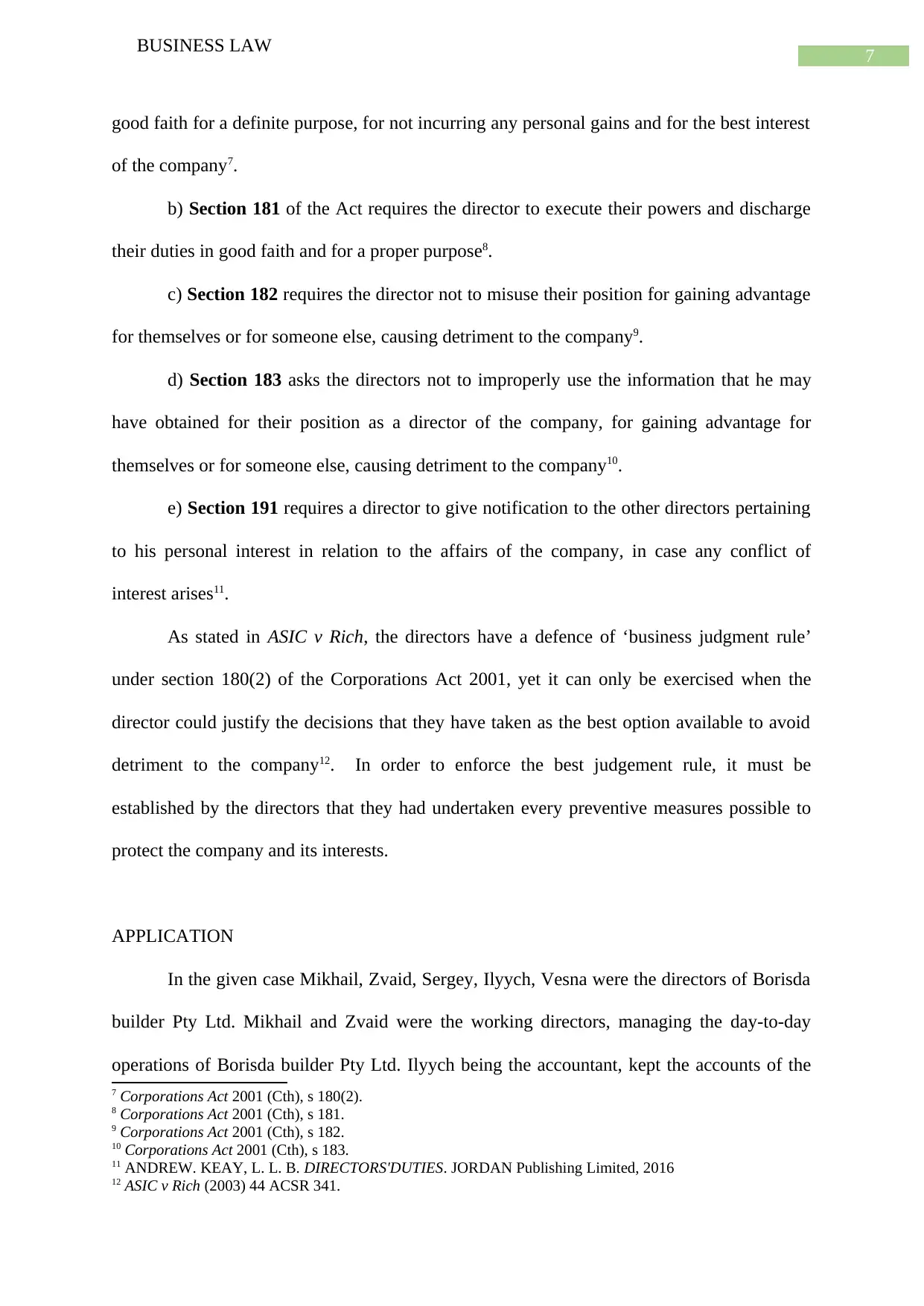
7
BUSINESS LAW
good faith for a definite purpose, for not incurring any personal gains and for the best interest
of the company7.
b) Section 181 of the Act requires the director to execute their powers and discharge
their duties in good faith and for a proper purpose8.
c) Section 182 requires the director not to misuse their position for gaining advantage
for themselves or for someone else, causing detriment to the company9.
d) Section 183 asks the directors not to improperly use the information that he may
have obtained for their position as a director of the company, for gaining advantage for
themselves or for someone else, causing detriment to the company10.
e) Section 191 requires a director to give notification to the other directors pertaining
to his personal interest in relation to the affairs of the company, in case any conflict of
interest arises11.
As stated in ASIC v Rich, the directors have a defence of ‘business judgment rule’
under section 180(2) of the Corporations Act 2001, yet it can only be exercised when the
director could justify the decisions that they have taken as the best option available to avoid
detriment to the company12. In order to enforce the best judgement rule, it must be
established by the directors that they had undertaken every preventive measures possible to
protect the company and its interests.
APPLICATION
In the given case Mikhail, Zvaid, Sergey, Ilyych, Vesna were the directors of Borisda
builder Pty Ltd. Mikhail and Zvaid were the working directors, managing the day-to-day
operations of Borisda builder Pty Ltd. Ilyych being the accountant, kept the accounts of the
7 Corporations Act 2001 (Cth), s 180(2).
8 Corporations Act 2001 (Cth), s 181.
9 Corporations Act 2001 (Cth), s 182.
10 Corporations Act 2001 (Cth), s 183.
11 ANDREW. KEAY, L. L. B. DIRECTORS'DUTIES. JORDAN Publishing Limited, 2016
12 ASIC v Rich (2003) 44 ACSR 341.
BUSINESS LAW
good faith for a definite purpose, for not incurring any personal gains and for the best interest
of the company7.
b) Section 181 of the Act requires the director to execute their powers and discharge
their duties in good faith and for a proper purpose8.
c) Section 182 requires the director not to misuse their position for gaining advantage
for themselves or for someone else, causing detriment to the company9.
d) Section 183 asks the directors not to improperly use the information that he may
have obtained for their position as a director of the company, for gaining advantage for
themselves or for someone else, causing detriment to the company10.
e) Section 191 requires a director to give notification to the other directors pertaining
to his personal interest in relation to the affairs of the company, in case any conflict of
interest arises11.
As stated in ASIC v Rich, the directors have a defence of ‘business judgment rule’
under section 180(2) of the Corporations Act 2001, yet it can only be exercised when the
director could justify the decisions that they have taken as the best option available to avoid
detriment to the company12. In order to enforce the best judgement rule, it must be
established by the directors that they had undertaken every preventive measures possible to
protect the company and its interests.
APPLICATION
In the given case Mikhail, Zvaid, Sergey, Ilyych, Vesna were the directors of Borisda
builder Pty Ltd. Mikhail and Zvaid were the working directors, managing the day-to-day
operations of Borisda builder Pty Ltd. Ilyych being the accountant, kept the accounts of the
7 Corporations Act 2001 (Cth), s 180(2).
8 Corporations Act 2001 (Cth), s 181.
9 Corporations Act 2001 (Cth), s 182.
10 Corporations Act 2001 (Cth), s 183.
11 ANDREW. KEAY, L. L. B. DIRECTORS'DUTIES. JORDAN Publishing Limited, 2016
12 ASIC v Rich (2003) 44 ACSR 341.
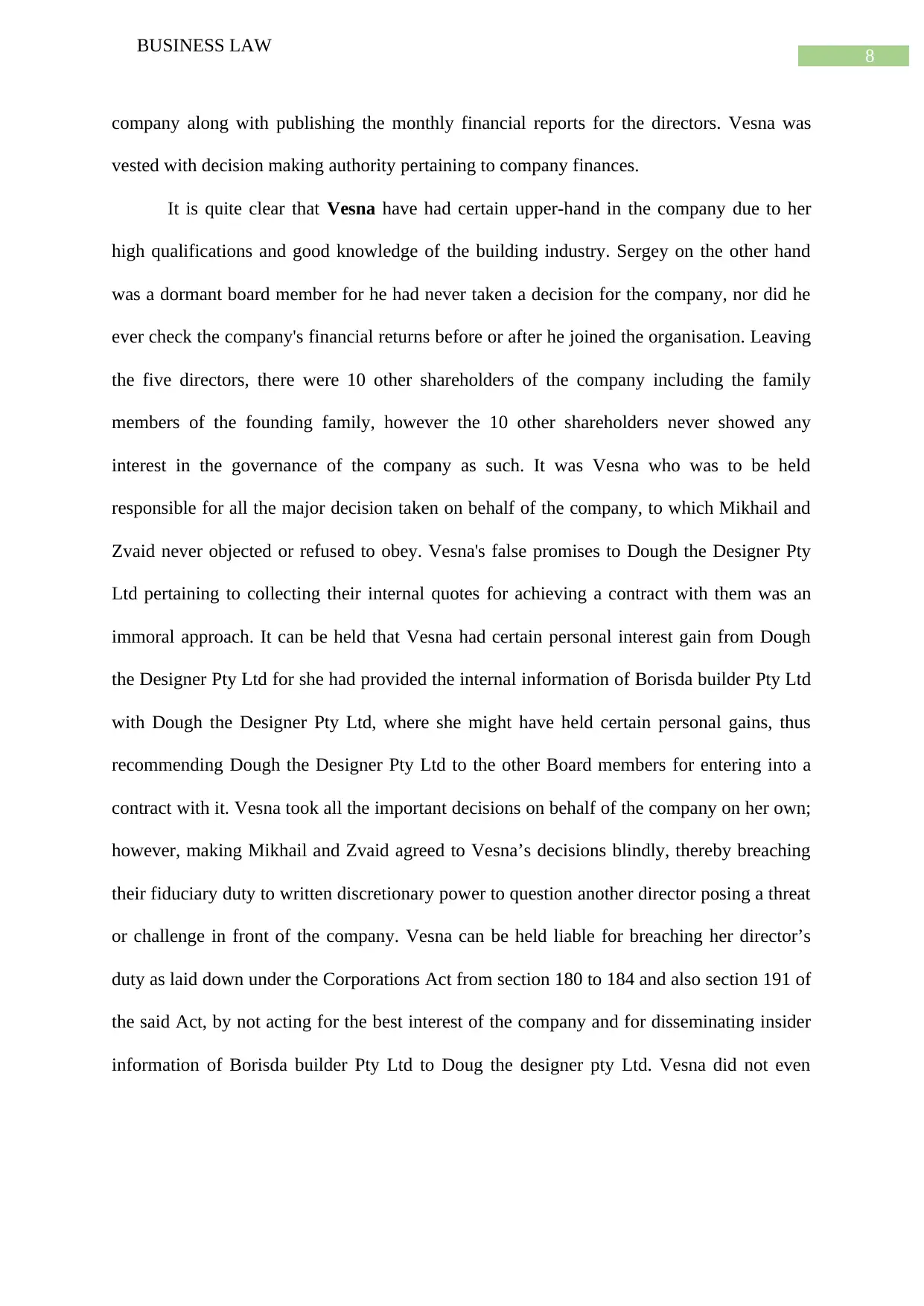
8
BUSINESS LAW
company along with publishing the monthly financial reports for the directors. Vesna was
vested with decision making authority pertaining to company finances.
It is quite clear that Vesna have had certain upper-hand in the company due to her
high qualifications and good knowledge of the building industry. Sergey on the other hand
was a dormant board member for he had never taken a decision for the company, nor did he
ever check the company's financial returns before or after he joined the organisation. Leaving
the five directors, there were 10 other shareholders of the company including the family
members of the founding family, however the 10 other shareholders never showed any
interest in the governance of the company as such. It was Vesna who was to be held
responsible for all the major decision taken on behalf of the company, to which Mikhail and
Zvaid never objected or refused to obey. Vesna's false promises to Dough the Designer Pty
Ltd pertaining to collecting their internal quotes for achieving a contract with them was an
immoral approach. It can be held that Vesna had certain personal interest gain from Dough
the Designer Pty Ltd for she had provided the internal information of Borisda builder Pty Ltd
with Dough the Designer Pty Ltd, where she might have held certain personal gains, thus
recommending Dough the Designer Pty Ltd to the other Board members for entering into a
contract with it. Vesna took all the important decisions on behalf of the company on her own;
however, making Mikhail and Zvaid agreed to Vesna’s decisions blindly, thereby breaching
their fiduciary duty to written discretionary power to question another director posing a threat
or challenge in front of the company. Vesna can be held liable for breaching her director’s
duty as laid down under the Corporations Act from section 180 to 184 and also section 191 of
the said Act, by not acting for the best interest of the company and for disseminating insider
information of Borisda builder Pty Ltd to Doug the designer pty Ltd. Vesna did not even
BUSINESS LAW
company along with publishing the monthly financial reports for the directors. Vesna was
vested with decision making authority pertaining to company finances.
It is quite clear that Vesna have had certain upper-hand in the company due to her
high qualifications and good knowledge of the building industry. Sergey on the other hand
was a dormant board member for he had never taken a decision for the company, nor did he
ever check the company's financial returns before or after he joined the organisation. Leaving
the five directors, there were 10 other shareholders of the company including the family
members of the founding family, however the 10 other shareholders never showed any
interest in the governance of the company as such. It was Vesna who was to be held
responsible for all the major decision taken on behalf of the company, to which Mikhail and
Zvaid never objected or refused to obey. Vesna's false promises to Dough the Designer Pty
Ltd pertaining to collecting their internal quotes for achieving a contract with them was an
immoral approach. It can be held that Vesna had certain personal interest gain from Dough
the Designer Pty Ltd for she had provided the internal information of Borisda builder Pty Ltd
with Dough the Designer Pty Ltd, where she might have held certain personal gains, thus
recommending Dough the Designer Pty Ltd to the other Board members for entering into a
contract with it. Vesna took all the important decisions on behalf of the company on her own;
however, making Mikhail and Zvaid agreed to Vesna’s decisions blindly, thereby breaching
their fiduciary duty to written discretionary power to question another director posing a threat
or challenge in front of the company. Vesna can be held liable for breaching her director’s
duty as laid down under the Corporations Act from section 180 to 184 and also section 191 of
the said Act, by not acting for the best interest of the company and for disseminating insider
information of Borisda builder Pty Ltd to Doug the designer pty Ltd. Vesna did not even
⊘ This is a preview!⊘
Do you want full access?
Subscribe today to unlock all pages.

Trusted by 1+ million students worldwide
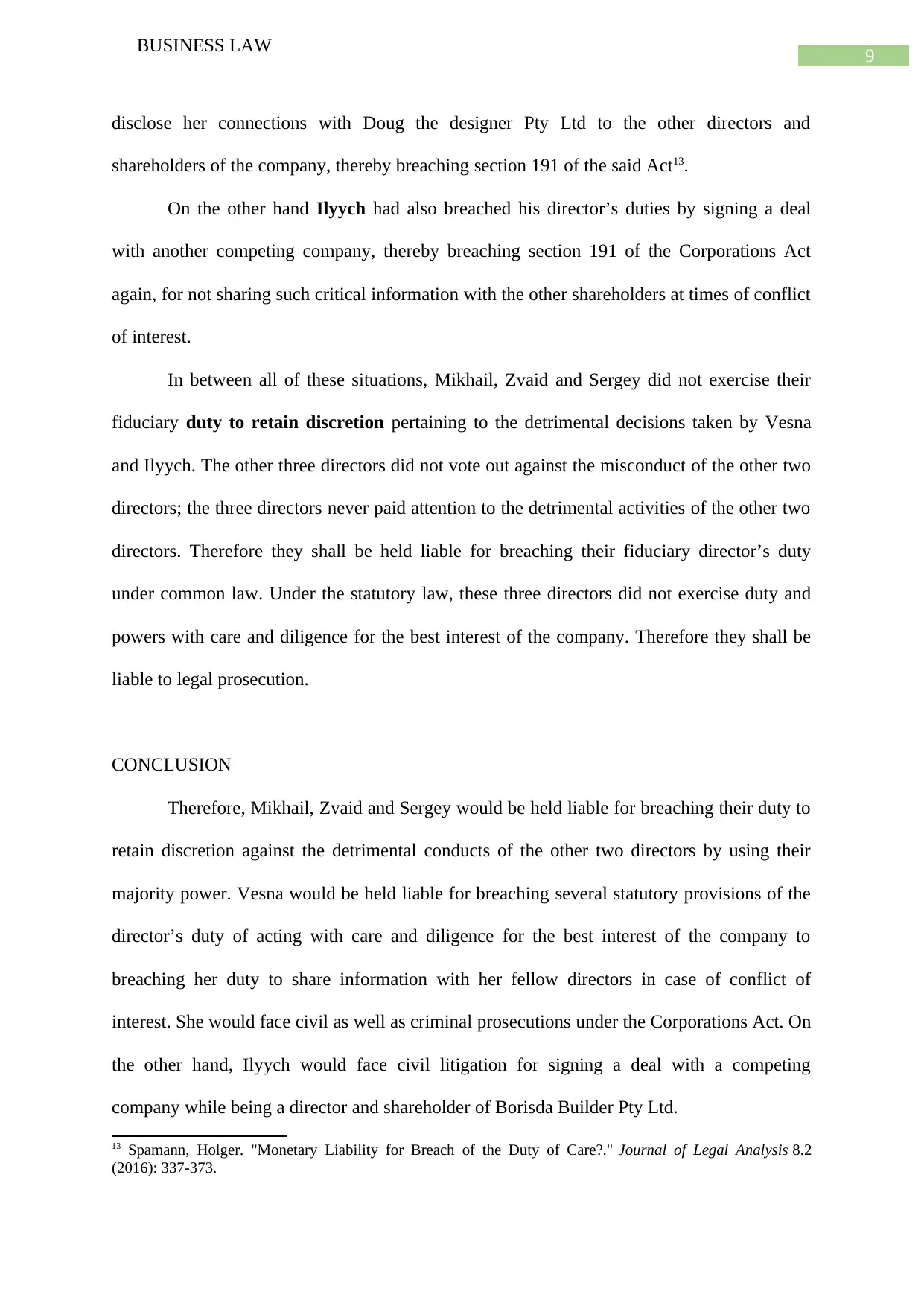
9
BUSINESS LAW
disclose her connections with Doug the designer Pty Ltd to the other directors and
shareholders of the company, thereby breaching section 191 of the said Act13.
On the other hand Ilyych had also breached his director’s duties by signing a deal
with another competing company, thereby breaching section 191 of the Corporations Act
again, for not sharing such critical information with the other shareholders at times of conflict
of interest.
In between all of these situations, Mikhail, Zvaid and Sergey did not exercise their
fiduciary duty to retain discretion pertaining to the detrimental decisions taken by Vesna
and Ilyych. The other three directors did not vote out against the misconduct of the other two
directors; the three directors never paid attention to the detrimental activities of the other two
directors. Therefore they shall be held liable for breaching their fiduciary director’s duty
under common law. Under the statutory law, these three directors did not exercise duty and
powers with care and diligence for the best interest of the company. Therefore they shall be
liable to legal prosecution.
CONCLUSION
Therefore, Mikhail, Zvaid and Sergey would be held liable for breaching their duty to
retain discretion against the detrimental conducts of the other two directors by using their
majority power. Vesna would be held liable for breaching several statutory provisions of the
director’s duty of acting with care and diligence for the best interest of the company to
breaching her duty to share information with her fellow directors in case of conflict of
interest. She would face civil as well as criminal prosecutions under the Corporations Act. On
the other hand, Ilyych would face civil litigation for signing a deal with a competing
company while being a director and shareholder of Borisda Builder Pty Ltd.
13 Spamann, Holger. "Monetary Liability for Breach of the Duty of Care?." Journal of Legal Analysis 8.2
(2016): 337-373.
BUSINESS LAW
disclose her connections with Doug the designer Pty Ltd to the other directors and
shareholders of the company, thereby breaching section 191 of the said Act13.
On the other hand Ilyych had also breached his director’s duties by signing a deal
with another competing company, thereby breaching section 191 of the Corporations Act
again, for not sharing such critical information with the other shareholders at times of conflict
of interest.
In between all of these situations, Mikhail, Zvaid and Sergey did not exercise their
fiduciary duty to retain discretion pertaining to the detrimental decisions taken by Vesna
and Ilyych. The other three directors did not vote out against the misconduct of the other two
directors; the three directors never paid attention to the detrimental activities of the other two
directors. Therefore they shall be held liable for breaching their fiduciary director’s duty
under common law. Under the statutory law, these three directors did not exercise duty and
powers with care and diligence for the best interest of the company. Therefore they shall be
liable to legal prosecution.
CONCLUSION
Therefore, Mikhail, Zvaid and Sergey would be held liable for breaching their duty to
retain discretion against the detrimental conducts of the other two directors by using their
majority power. Vesna would be held liable for breaching several statutory provisions of the
director’s duty of acting with care and diligence for the best interest of the company to
breaching her duty to share information with her fellow directors in case of conflict of
interest. She would face civil as well as criminal prosecutions under the Corporations Act. On
the other hand, Ilyych would face civil litigation for signing a deal with a competing
company while being a director and shareholder of Borisda Builder Pty Ltd.
13 Spamann, Holger. "Monetary Liability for Breach of the Duty of Care?." Journal of Legal Analysis 8.2
(2016): 337-373.
Paraphrase This Document
Need a fresh take? Get an instant paraphrase of this document with our AI Paraphraser
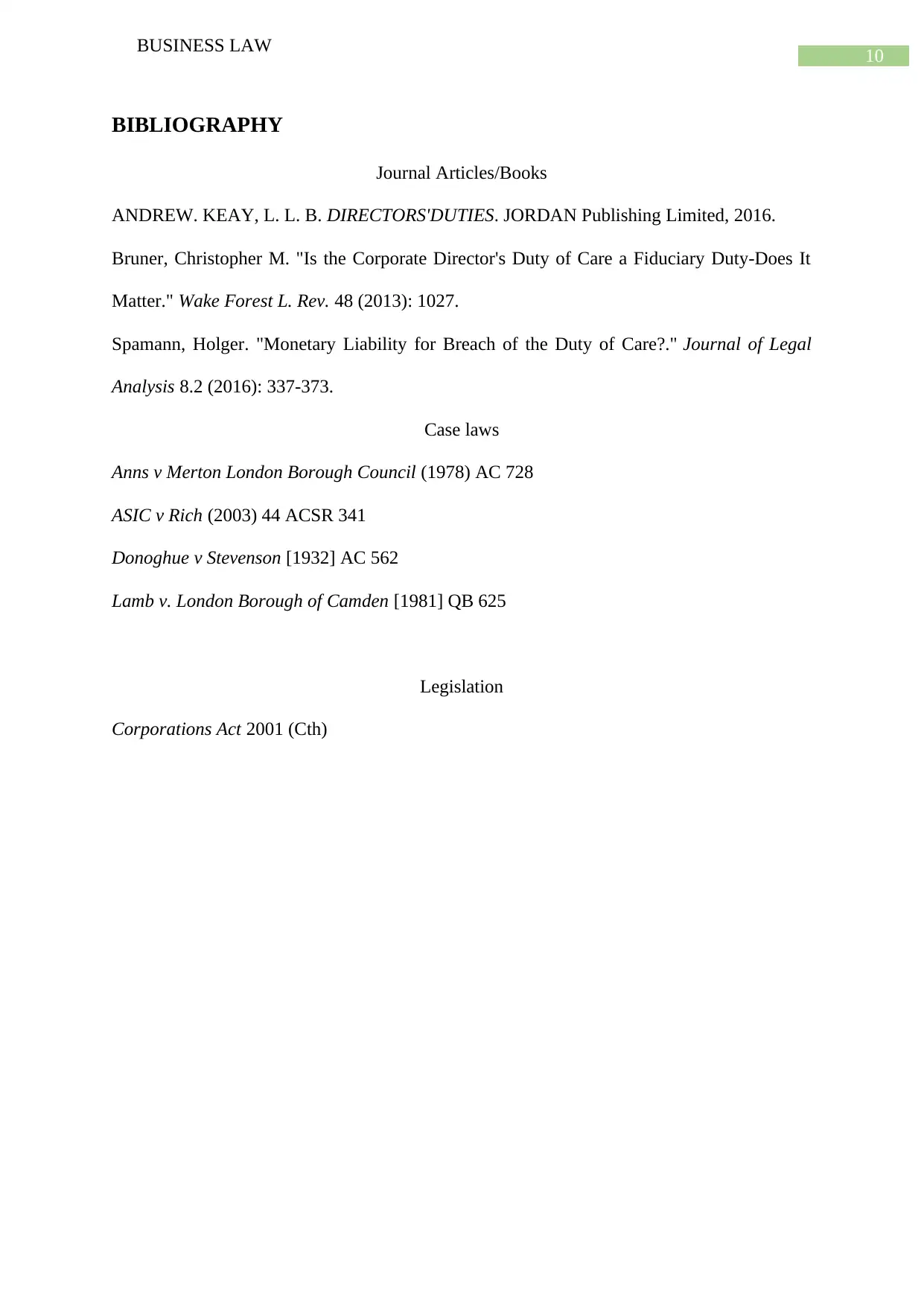
10
BUSINESS LAW
BIBLIOGRAPHY
Journal Articles/Books
ANDREW. KEAY, L. L. B. DIRECTORS'DUTIES. JORDAN Publishing Limited, 2016.
Bruner, Christopher M. "Is the Corporate Director's Duty of Care a Fiduciary Duty-Does It
Matter." Wake Forest L. Rev. 48 (2013): 1027.
Spamann, Holger. "Monetary Liability for Breach of the Duty of Care?." Journal of Legal
Analysis 8.2 (2016): 337-373.
Case laws
Anns v Merton London Borough Council (1978) AC 728
ASIC v Rich (2003) 44 ACSR 341
Donoghue v Stevenson [1932] AC 562
Lamb v. London Borough of Camden [1981] QB 625
Legislation
Corporations Act 2001 (Cth)
BUSINESS LAW
BIBLIOGRAPHY
Journal Articles/Books
ANDREW. KEAY, L. L. B. DIRECTORS'DUTIES. JORDAN Publishing Limited, 2016.
Bruner, Christopher M. "Is the Corporate Director's Duty of Care a Fiduciary Duty-Does It
Matter." Wake Forest L. Rev. 48 (2013): 1027.
Spamann, Holger. "Monetary Liability for Breach of the Duty of Care?." Journal of Legal
Analysis 8.2 (2016): 337-373.
Case laws
Anns v Merton London Borough Council (1978) AC 728
ASIC v Rich (2003) 44 ACSR 341
Donoghue v Stevenson [1932] AC 562
Lamb v. London Borough of Camden [1981] QB 625
Legislation
Corporations Act 2001 (Cth)
1 out of 11
Related Documents
Your All-in-One AI-Powered Toolkit for Academic Success.
+13062052269
info@desklib.com
Available 24*7 on WhatsApp / Email
![[object Object]](/_next/static/media/star-bottom.7253800d.svg)
Unlock your academic potential
Copyright © 2020–2026 A2Z Services. All Rights Reserved. Developed and managed by ZUCOL.





